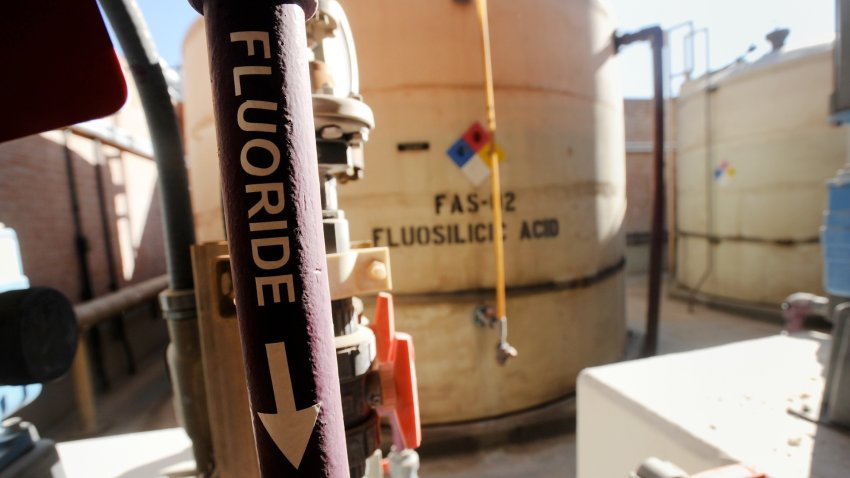-

Science 4 Everyone: What is pickling and why it's important for preservation
On this Science 4 Everyone, Storm Team4 Meteorologist (and Science Teacher!) Ryan Miller explains the process of pickling vegetables and fruits and how it helps preserve them.
-

Vaccines don't cause autism. What does?
Robert F. Kennedy Jr.’s false claims linking autism to childhood vaccinations are receiving new scrutiny now that President-elect Donald Trump has selected him to lead the Department of Health and Human Services, a sprawling agency with a budget of $1.7 trillion that oversees research into both autism and vaccines.
-

CDC confirms first H5N1 bird flu infection in child
The child experienced mild symptoms, according to the Centers for Disease Control and Control and Prevention.
-

Surgeon general report says smoking causes 500,000 deaths a year, finds major disparities for smoking rates based on race and income
A report from the U.S. surgeon general found significant disparities in smoking rates based on race, income and sexual orientation, and said smoking and secondhand smoke cause 500,000 deaths every year.
-

What to know about Robert F. Kennedy Jr., Trump's pick for health secretary
Robert F. Kennedy Jr. has promoted claims about vaccines that contradict the overwhelming consensus of scientists.
-

Survey finds 2 in 5 Americans worry about overeating over the holidays
A new survey from Orlando Health found 39% of American adults worry about how much they will eat over the holidays, but dietitians say fears of weight gain or other negative effects are overblown.
-

Study finds beer drinkers have less healthy lifestyles than wine drinkers
A study from the American Association for the Study of Liver Diseases found beer drinkers usually have less healthy lifestyles than drinkers who prefer wine, liquor or a combination of alcohol types.
-

More women seek testosterone therapy, prompted by influencers, doctors say
With the rise of telemedicine and testosterone replacement clinics opening up across the country, access to the drug has never been easier.
-

Will fluoride go away when Trump takes office?
Dentists say fluoridated water was one of the most significant public health advances in recent memory. The incoming administration may not see it that way.
-

Why is there fluoride in drinking water?
Fluoride is added to drinking water to prevent tooth decay and reduce other dental-related illnesses, according to the American Dental Association and CDC.
-

Diagnosed with disease he studied, California doctor puts his personal story at center of new class
Dr. Bryant Lin is hoping his cancer journey can be a teaching moment for future physicians.
-

Clinical trials sparking hope for Alzheimer's patients: ‘Holding my own'
A clinical trial is testing whether an existing drug could benefit patients with Alzheimer’s disease, in hopes of making symptom-improving medication more accessible for people experiencing mild cognitive impairment.
-

New stents for infants mean kids could avoid series of open heart operations
For decades, when babies with congenital heart defects needed stents, doctors would modify ones meant for adults so they would fit into much smaller hearts.
-

Rapid tests: When to take them and do they actually expire?
There are some rapid tests you might be able to take past the expiration date on the box. Here’s what to know.
-

Why some doctors see a downside to notifying women about dense breasts
Due to a new FDA rule, women 40 and older in every state are now receiving letters about their breast density along with their standard mammogram results.
-

What are PFAS?
Commonly referred to as “forever chemicals,” PFAS are found in many everyday products and even inside our bodies. So what are they?
-

Brett Favre's Parkinson's diagnosis reignites questions about football's link to brain disease
Research suggests that concussions from football can raise the risk of Parkinson’s and other neurodegenerative diseases.
-

Black women are more likely than white women to die of all types of breast cancer
Black women are more likely than white women to die from even the most treatable types of breast cancer, a study published Tuesday in the Journal of Clinical Oncology found.
-

‘Operating room of the future' can eliminate need for a second surgery
Unlike other operating rooms, this one is equipped with a moveable MRI system that slides on a track, allowing doctors to take scans during surgery in real time.
-

See the new tech inside ‘the operating room of the future'
Unlike other operating rooms, this one is equipped with a moveable MRI system that slides on a track, allowing doctors to take scans during surgery in real time. News4’s Erika Gonzalez reports.

